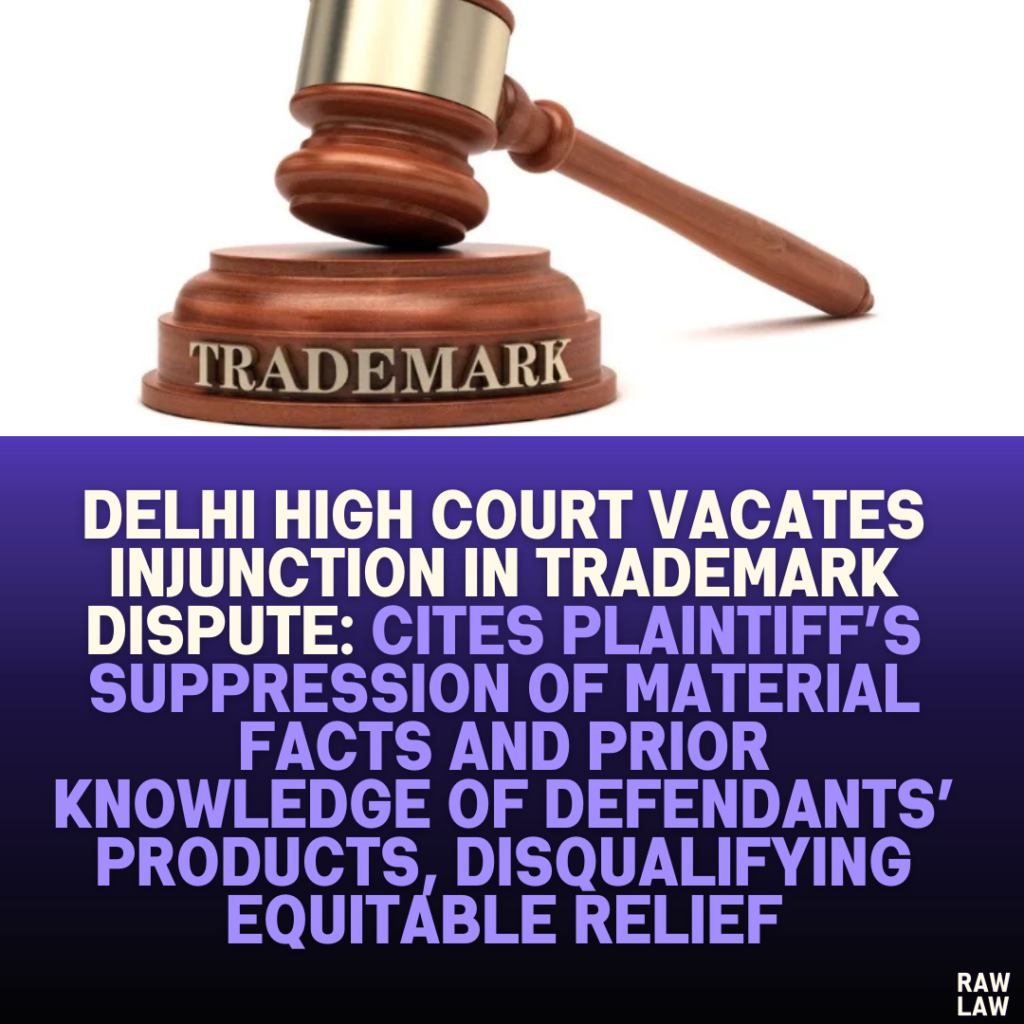Court’s Decision:
The Delhi High Court vacated the ex-parte ad interim injunction granted to the plaintiff on November 8, 2024. The court concluded that the plaintiff had suppressed material facts about its prior knowledge of the defendants’ products and misrepresented these facts to obtain an interim relief. The defendants were allowed to resume their business activities, and the court directed the release of the seized products for lawful marketing.
Facts:
- The plaintiff alleged trademark infringement, asserting exclusive rights over the trade dress and marks associated with its wheat seed products “Shriram Super 303” and “Shriram Super 404.”
- According to the plaintiff, they became aware of the defendants’ infringing activities on October 30, 2024, when an operative discovered products with similar packaging being sold in Bihar. The operative also obtained a copy of a license issued to the defendants for selling these products.
- The plaintiff secured an injunction based on its claim of discovering the infringement only a few days prior to filing the suit.
Issues:
- Did the plaintiff suppress material facts about its prior knowledge of the defendants’ activities?
- Was the injunction obtained by the plaintiff based on misrepresentation?
- Are numbers like “303” and “404” generic seed varieties that the plaintiff cannot claim exclusivity over?
Petitioner’s Arguments:
- The plaintiff claimed that the defendants’ packaging was deceptively similar to their established trade dress, likely to confuse consumers and harm their brand identity.
- They argued that their products were well-known since 2013 and 2015 (for “303” and “404” respectively) and that the defendants were infringing on their statutory and common law rights.
- The plaintiff emphasized that the similarity in packaging was intentional and designed to mislead rural consumers.
Respondent’s Arguments:
- The defendants countered that they had been selling their products, labeled “Sartaj 303” and “Sartaj 404,” since 2014, predating the plaintiff’s “404” product by a year.
- They presented evidence of a letter dated November 20, 2018, signed by the plaintiff’s representative, proving the plaintiff’s knowledge of their products since 2018. This contradicted the plaintiff’s claim of discovering the infringement only in 2024.
- The defendants also argued that “303” and “404” were generic identifiers for seed varieties and could not be monopolized by the plaintiff.
- They contended that the injunction was obtained by suppressing material facts and misleading the court.
Analysis of the Law:
- Duty to Disclose Material Facts: Under Order XI of the CPC, litigants are required to disclose all relevant documents and facts that could influence the court’s decision. The plaintiff’s failure to disclose the 2018 letter violated this duty.
- Equity Principles: The court reaffirmed that parties seeking equitable relief must approach the court with clean hands. Suppression or misrepresentation disqualifies a litigant from obtaining such relief.
- Generic Terms in Trademark Law: The court considered the defendants’ argument that numbers like “303” and “404” referred to seed varieties, not proprietary marks, reducing the plaintiff’s claim of exclusivity.
Precedent Analysis:
The court relied on several key judgments to establish the importance of transparency:
- Freebit AS v. Exotic Mile Private Limited (2023): Suppression of material facts is grounds for rejecting equitable relief.
- Satish Khosla v. Eli Lilly Ranbaxy Ltd. (1998): A litigant must disclose all relevant information, including prior litigation or knowledge of the opposing party’s activities.
- Kent RO Systems Ltd. v. Gattubhai (2022): Interim injunctions obtained through suppression or concealment of facts are liable to be vacated.
- Kishore Samrite v. State of U.P. (2013): Suppressing material facts amounts to abusing the court’s process and can lead to contempt proceedings.
Court’s Reasoning:
- Suppression of Facts: The court found that the plaintiff’s claim of discovering the defendants’ products only in 2024 was false. Evidence presented by the defendants proved that the plaintiff had knowledge of their activities since 2018.
- Misrepresentation: By withholding critical information, the plaintiff misled the court into granting an injunction. The court held that such conduct disentitles the plaintiff from equitable relief.
- Generic Terms and Prior Use: The defendants demonstrated that they had been using the marks “303” and “404” for their seed products since 2014, predating the plaintiff’s use of “404.” The court also noted that these numbers were associated with specific seed varieties, not proprietary trademarks.
Conclusion:
The court vacated the injunction, holding that:
- The plaintiff acted in bad faith by suppressing material facts.
- The defendants were entitled to continue their business activities lawfully.
- The seized products should be released to the defendants for lawful marketing.
The court referred the issue of packaging similarity to mediation, recognizing the potential for consumer confusion in rural markets but emphasizing the need for transparency in legal proceedings.
Implications:
- Transparency in Trademark Disputes: The judgment underscores the importance of full disclosure in intellectual property cases. Suppression or misrepresentation can lead to the denial of relief, regardless of the merits of the underlying claim.
- Protection for Generic Terms: Businesses cannot claim exclusivity over generic or descriptive terms, particularly in industries like agriculture, where such identifiers often denote specific product characteristics.
- Fair Adjudication: The case reinforces the principle that courts will not reward litigants who attempt to gain an unfair advantage through concealment or dishonesty.



